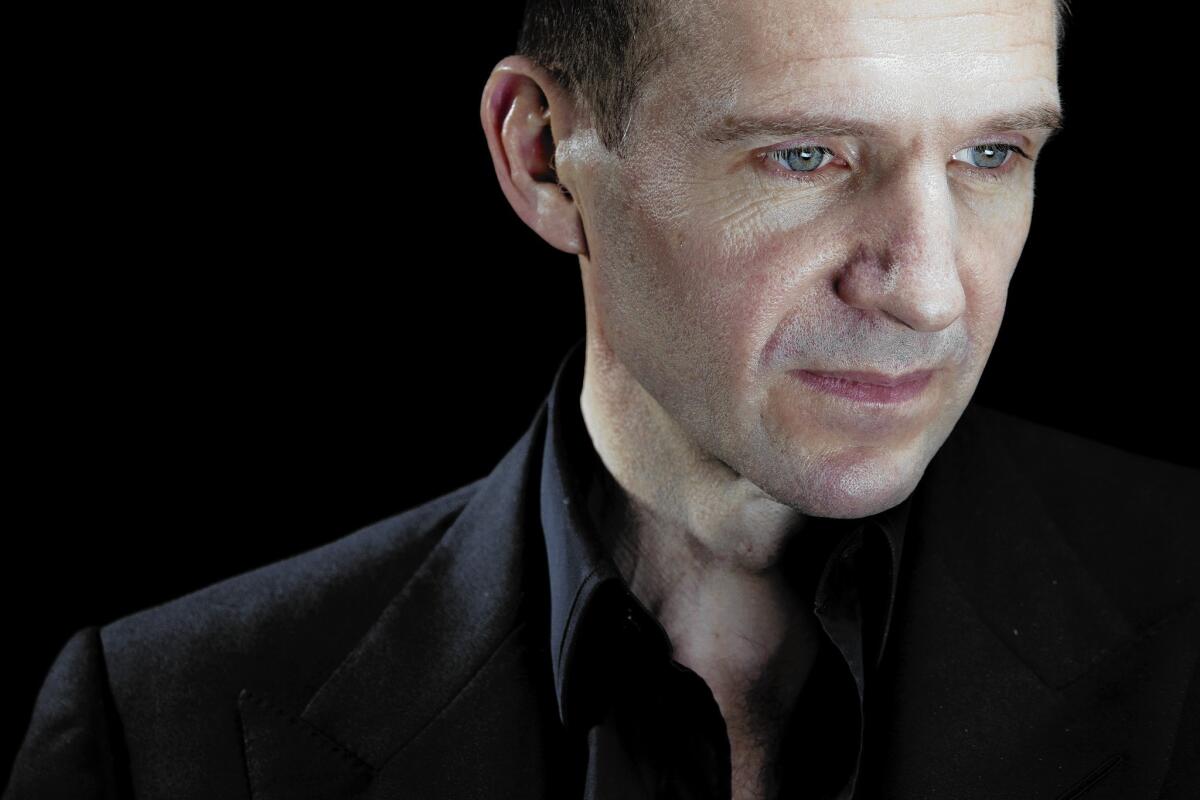Ralph Fiennes on Dickens and directing ‘The Invisible Woman’

- Share via
After making his feature directorial debut in 2011 with his fierce, unsparing adaptation of Shakespeare’s “Coriolanus,” Ralph Fiennes is in the director’s chair once again for “The Invisible Woman,” which opens Christmas Day.
Based on the book by Claire Tomalin, the romantic drama chronicles the relationship between Charles Dickens and actress Nelly Ternan (Felicity Jones). The writer of such literary masterpieces as “Great Expectations,” “A Tale of Two Cities” and “A Christmas Carol” was married with 10 children when he met the teenager, who toiled on stage with her mother and two older sisters. Dickens separated from his wife to be with Nelly, but as a “proper” Victorian gentleman he could never divorce and marry her. So Nelly became the “Invisible Woman.”
Fiennes, 51, earned Oscar nominations for the Oscar-winning best films “Schindler’s List” (1993) and “The English Patient” (1996) as well as appearing in such films as “Quiz Show,” “The Constant Gardener,” “The Hurt Locker” and “Skyfall.” And he scared the daylights out of audiences as Voldemort in the “Harry Potter” blockbusters.
VIDEO: Ralph Fiennes and Felicity Jones on ‘The Invisible Woman’
During a recent visit to Los Angeles, Fiennes was in high spirits when he chatted about “The Invisible Woman” over French press coffee in the lobby of the Chateau Marmont.
Charles Dickens seems very much like the characters that inhabit his books — funny, warm, larger than life, romantic, tragic and flawed.
He’s a man of contradictions. There is a sort of boyishness to him, a boyish energy. I think he could be domineering and then he had a sort of madcap quality to him as well, combined with this manic, furious work ethic. His energy for work was terrifying. He was unstoppable.
He also could be cruel, especially in the one scene where he sends his wife to give Nelly a gift of jewelry he brought for her.
Of course, it’s cruel, but people are cruel. We can’t expect our great artists to be saints. I think he had a cruel streak. He was a dominating father. I think he was the kind of father who very rarely praised his children. He was disappointed in his sons and only one of them, Henry, went on to be professionally really successful. Even with his daughters, he was very domineering about who she should marry. There is a quote of Katie Dickens saying, “My father was not a good man, but he was a great man.”
I realized watching this film I knew very little about Dickens, let alone his relationship with Nelly.
I was ignorant about Dickens.
You’re kidding! You didn’t read him growing up?
I was familiar with his stories through adaptations of the movies like the David Lean films, BBC adaptations, and as children we had a recording of “A Christmas Carol” on a vinyl disc. I was never asked to study Dickens at school.
GRAPHIC: Best of 2013 | Entertainment and culture
Was that a hindrance or a help when you read Abi Morgan’s script based on Claire Tomalin’s book?
In a perverse way I’m kind of grateful. I read the script, and I read Claire Tomalin’s book, and I was completely enthralled by the way she describes this 19th century theater world and the background of the Ternan family. These women had to find a survival strategy because their working life was extremely limited. ... It’s a very difficult profession, and you have a brief moment in the limelight. So she sets that up and brings in Dickens.
Felicity Jones captures the youthful spirit of the teenager whom Dickens fell in love with as well as her resiliency after his death and the bravery to re-invent herself.
What she suggests subtly is so full and so rich. She is very intelligent. You feel that active mind, and I love that. She has this magic gift — the camera can be on her and I feel always curious to know what she is holding inside herself. Also, she has to play this woman in her late teens and then 15 years older. I wanted someone who could suggest that change.
You have worked with such legendary filmmakers as Steven Spielberg, Kathryn Bigelow, Anthony Minghella and Robert Redford. Did they inspire you to become a director?
I think the curiosity emerged. It was something that built up over time. “Coriolanus” was something I always dreamed of being a film. But a producer that I worked with on “The Constant Gardener,” Simon Channing Williams — sadly he is dead now — said to me on the end of the filming, “I would like to produce your first film as a director.” He sent me a script that I liked. Sadly, it didn’t work and then he got ill. But I think the experience working with him and sort of having meetings with screenwriters gave me the confidence to do “Coriolanus.”
Would you ever give up acting to concentrate solely on directing?
I wouldn’t give up acting, but directing is a new path. It has been full of challenges and scary moments when you wonder whether it is going to work. But I have been able to work with amazing people. I have loved it.
PHOTOS AND MORE
PHOTOS: Faces to watch 2014 | Movies
ENVELOPE: The latest awards buzz
PHOTOS: Greatest box office flops
More to Read
Only good movies
Get the Indie Focus newsletter, Mark Olsen's weekly guide to the world of cinema.
You may occasionally receive promotional content from the Los Angeles Times.











